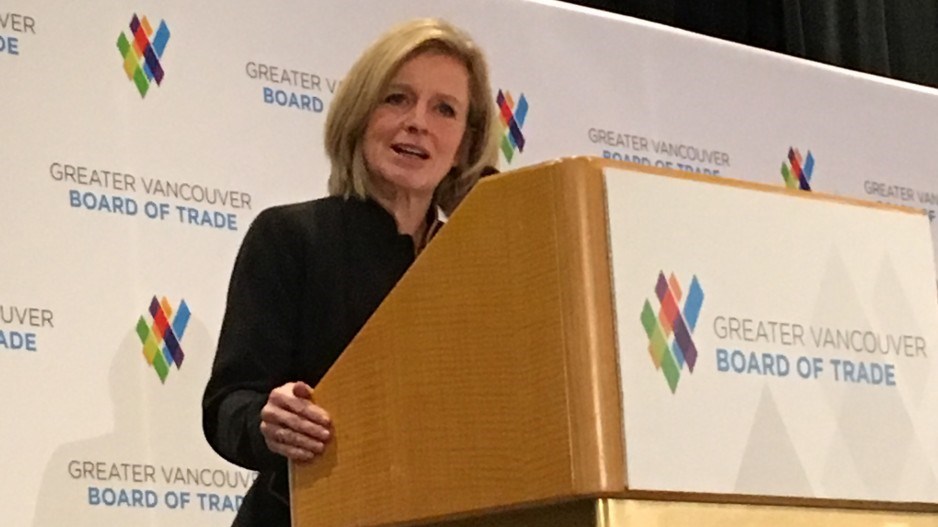If an election were held today, Jason Kenney and his newly merged United Conservative Party would likely unseat Rachel Notley’s NDP government in Alberta, if recent polls are to be believed.
And that could throw a serious wrench into Canada’s plans to meet its Paris climate change commitments.
Kenney has vowed to scrap Alberta’s carbon tax and partner with Saskatchewan to plunge Canada into a constitutional debate over the use of oil and gas revenue to fund Canada’s equalization payment formula – the flashpoint being Ottawa’s own carbon-pricing rules.
Alberta could revert from having adopted what is arguably one of North America’s most aggressive climate change action plans to indifference over its carbon obesity problem.
“As Canada’s largest energy producer, we know that we have a unique responsibility to tackle climate change,” Alberta Premier Rachel Notley said at a November 30 energy forum in Vancouver hosted by the Greater Vancouver Board of Trade (GVBOT). “And we know that any climate action plan that doesn’t include Alberta, frankly, is not a plan. It won’t work.”
The next Alberta election is nearly a year and a half away – still time for Notley to pull off a miracle.
Such a miracle might include selling Albertans on an aggressive climate change plan that includes carbon taxes, coal power plant closures, a cap on oilsands emissions and new wind farms, all while getting a new pipleline built through B.C. to get Alberta oil to tidewater and foreign markets.
Albertans might be more inclined to swallow the former if Notley could deliver the latter. She could use a few friends to help pull that miracle off, but she has none in B.C., not at the political level.
Although Alberta could be instrumental in making B.C. a clean-energy powerhouse by agreeing to use B.C. clean electricity to help Alberta wean itself off coal, electrify the oil and gas sector, and backstop renewables, Notley is persona non grata as far as Vancouver’s mayor is concerned, and an inconvenience to BC NDP Premier John Horgan. Both are opposed to the Trans Mountain pipeline expansion.
Just three days before Notley’s visit, Vancouver Mayor Gregor Robertson spoke to another energy forum – Clean Energy BC’s Generate 2017 – where he slammed Notley and federal Natural Resources Minister Jim Carr for coming to Vancouver to promote pipelines.
“I know they are talking about pipelines this week in Vancouver, which is disturbing for me, when you have leadership at the provincial and federal levels that talk about the importance of renewable energy, that make commitments in Paris, and then they show up and promote pipelines and fossil fuel development,” Robertson said.
Horgan and Robertson were conspicuously absent when Notley spoke at GVBOT’s energy forum, which also included Carr and Kinder Morgan Canada (TSX:KML) president Ian Anderson as speakers.
A few dozen protesters gathered outside in the rain across from the Fairmont Waterfront Hotel, where the forum took place, and twice speakers were interrupted by pipeline protesters, who were quickly ushered out.
Carr said his government’s commitments to develop Canada’s natural resources and bring in strong climate change measures were not mutually exclusive goals.
While his government approved two oil pipelines – the $7.4 billion Trans Mountain expansion and Line 3 – Carr pointed out the Trudeau government also ratified the Paris Agreement, put a national price on carbon, committed to accelerating the phase-out of thermal coal power, plans to reduce methane emission in oil and gas sectors and is investing in “green” technology and infrastructure.
“Those who want to close the oilsands down tomorrow overlook the disruption it would cause to Canadian families and the loss of revenue that it provides for clean energy and innovation,” Carr said.
Notley’s government has capped oilsands emissions at 100 megatonnes, which she said means the Trans Mountain pipeline expansion would be essentially carbon neutral.
“I’m proud of the fact that, by capping these emissions, the Trans Mountain pipeline does not contribute to climate change,” Notley said. “The Trans Mountain pipeline will not – will not – increase [greenhouse gas] emissions from Alberta’s oilsands, and those who say otherwise are just playing politics, and they are playing politics with the jobs and livelihoods of working people.”
While Alberta’s oil industry contributes a disproportionate amount of greenhouse gas emissions in Canada, it also contributes a disproportionate amount of jobs, taxes and investment. Even in B.C., Notley said, an estimated 44,000 British Columbians work in Alberta, many of them in oil and gas sectors.
Some have questioned the Trudeau government’s resolve on seeing pipelines that it approved get built.
“Our government wants to see them built,” Carr insisted.
He later added that B.C.’s ambitions to see a liquefied natural gas industry developed would also have “the full support of the government of Canada.”
But one year after his government approved the Trans Mountain pipeline expansion, and $800 million later, very little work has been done on the $7.4 billion expansion project, and Kinder Morgan says the project is now nine months behind schedule.
“We simply cannot get to work yet,” Anderson said. “We’ve encountered continuing delays in the permitting process from the City of Burnaby. Processes that were designed to take five to seven weeks are now stretching into six and seven months.”
In response to the delay in permitting, the federal government recently wrote to the National Energy Board asking for a special resolution panel to be established to deal with permitting delays.
“What the government of Canada wants to ensure is that there aren’t unnecessary delays to a process which is a federally approved major energy project,” Carr said.
See related story on future demands for B.C. energy.




.jpg;w=120;h=80;mode=crop)